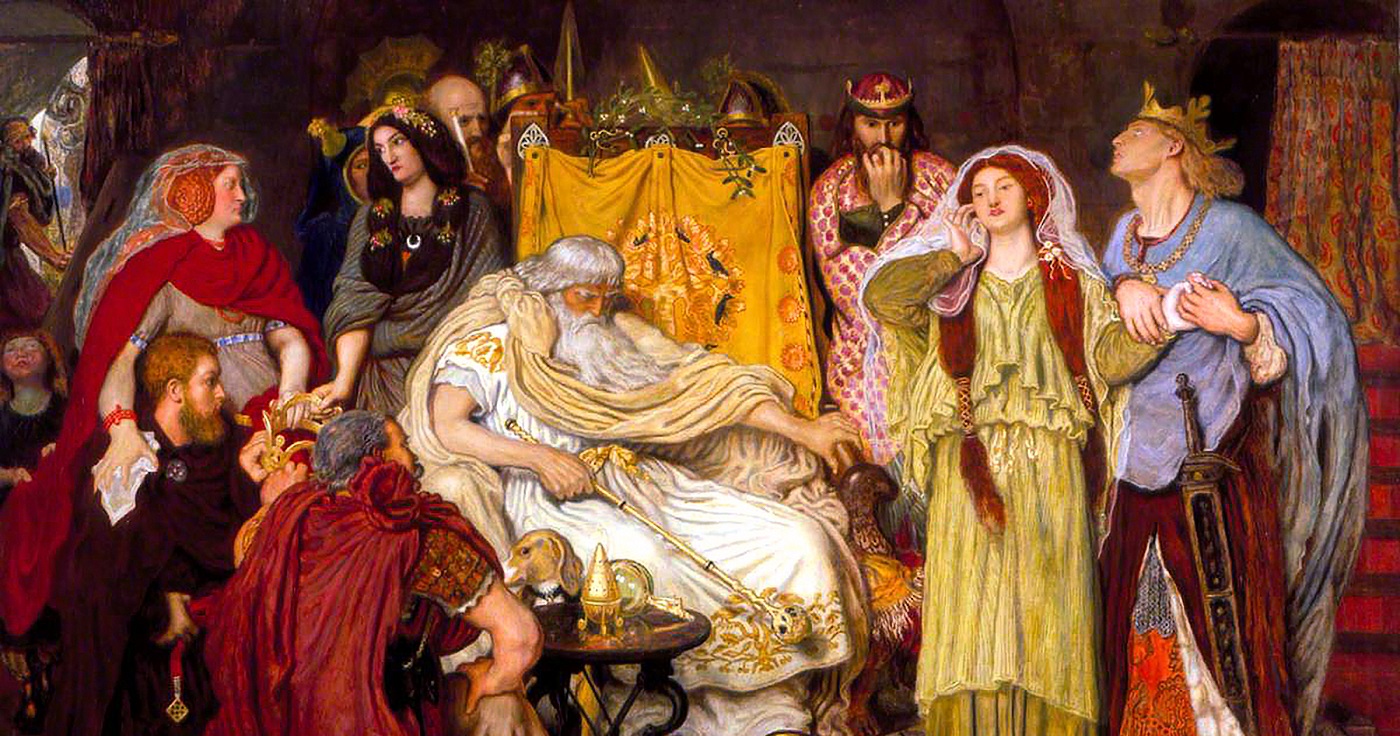
Before one can achieve anything (or even aspire to do so), one must find the inner resources needed to surmount challenges and acquire agency.
For this Whiteboard we reached out again to several scholars with the following prompt:
Describe a positive or negative leadership role model from a character in fantasy literature, science fiction, or general fiction.
Readers are invited to make their own contributions in the comments section.
1. Gabriel Aguilera (Dean of the Northern Region, School of Social Sciences and Government, Tecnológico De Monterrey, Campus Monterrey)
Shakespeare’s “Henriad” is teeming with haunting and terrifying poetry as well as keen insights into modern war and statecraft. These plays, a tetrarchy that kicks off with Richard II and ends with Henry V, are also full of memorable characters. Hotspur is Prince Hal’s main foil in Henry IV Parts 1 and 2. The prince goes on to become what the Chorus in Henry V calls, perhaps with some irony, the “mirror of all Christian kings.” Hal, a devout Christian, is also a ruthless statesman. A realist world unfolds in the Henriad, written and performed not very long after the The Prince had spread to England. Hotspur, and a host of other foils to Hal, are ill-prepared for a world shedding chivalry, religion, and honor, a world becoming ripe for modern princes.
Shakespeare thoroughly entertains us with political losers in the Henriad and few are more enjoyable than Hotspur. Readers can be forgiven for loving him unwisely and perhaps too well for his bravura, courage, and headlong recklessness. We are attracted to him perhaps in the same way that we are drawn to Top Gun’s Maverick. These antiheroes are often a lot more fun than those with whom they share center stage. The most notorious example in the Henriad is King Bolingbroke, an overbearing kill-joy who is mercilessly roasted and overshadowed by Falstaff in Henry IV Part 1 and by the narcissistic drama queen King Richard in Richard II. Although Bolingbroke is hard to root for, his dour, dissembling, and ruthless competence produces victory.
Hotspur is emblematic of that brilliant fighting general who is unfit for supreme command. Or that modern general who, after stumbling badly on the national political stage, is forcibly retired to a life of writing books on strategy and leadership. Hotspur, broken and left dead on the battlefield by Prince Hal, lives on in Shakespeare’s pantheon of lovable losers. There is no doubt, however, that he is a strategic dunce when contrasted with Hal, the soon-to-be king who ruthlessly plans and executes even his practical jokes and pranks. Hotspur’s sins are legion and unpardonable, perhaps the most notorious is his headlong choice to engage in a decisive battle outgunned, outmanned, and outbrained by Bolingbroke, one in which his own father refused to lend him arms. Hotspur proves a cautionary tale to all political leaders, in and out of uniform, who cling to military muscle as the main instrument of power.
2. Dr. Tami Davis Biddle (Professor of National Security Affairs, U.S. Army War College)
Game of Thrones is about power — how to get it and how to hold it. All the characters in the show are grappling with issues of power, whether it’s to gain dominion over others or merely to survive another day. Every character in the cast is complicated—wounded, vulnerable, grasping, striving. Before one can achieve anything (or even aspire to do so), one must find the inner resources needed to surmount challenges and acquire agency. George R.R. Martin gives equally complicated narrative arcs to his male and female characters – but the latter face a kind of double vulnerability due to the social and cultural constraints placed on them at birth. To gain power, women must overcome a larger set of hurdles.
A story about power is also, necessarily, a story about leadership. Gaining and holding the ability and the means to have others do as you wish (and not necessarily as they would prefer) requires a kind of finesse that derives from a variety of sources: instinct, predisposition, experience, moral vision, resiliency, and a willingness to constantly learn and adapt. In Martin’s world, as in ours, there is ongoing tension between realism and idealism. To gain power one must be strong, proactive, and confident. One must accept the world as it is: competitive and often violent. But to operate only in the realm of realism is to court a bad end: those who care only about power may acquire short term gains but will find themselves, ultimately, confronting the ineluctable human demand for justice. In a similar way, idealism untempered by strength and cunning is more folly than virtue. Roose and Ramsay Bolton are brought down by their own avarice and ruthlessness, while Ned Stark’s admirable loyalty nonetheless costs him his head.
Thus, to wield power for any length of time demands that one navigate between the requirement for survival and the requirement for justice. The ability to perform this feat comes, in every case, through education and experience. These are both essential – and are intertwined. Bran and Arya Stark endure long, painful educational journeys. Daenerys Targaryen and Jon Snow find that moral virtue, while crucial, is not enough. To lead successfully one must grow wise through education and experience (the latter including occasional failure). And one must become astute enough to surround one’s self with allies, and with clear-eyed, worldly counselors who are able, always, to speak the truth.
3. Dr. Andrew A. Hill (Former Chair of Strategic Leadership and The First Editor-In-Chief of War Room, The U.S. Army War College)
“Tell me, my daughters, which of you shall we say doth love us most.” This invitation to brown-nose in the first scene of Shakespeare’s History of King Lear is the inciting incident of the play. With this remarkable display of narcissism, Lear forges the first link in a hellish chain of cause and effect that drags himself, his kingdom, and his family down to ruin.*
The hatred of sycophants seems to be universal and to transcend cultures. The synonymous terms “brown-noser” and “ass-kisser” convey this loathing, and have equivalents in numerous foreign languages: in Spanish, chupa medias (“sock-sucker”); in French, lèche-bottes (boot-licker); in German, arschkriecher (ass-groveler); in Italian, leccapiedi (foot-licker) or, more crudely, leccaculo. I could go on, but mercifully, I won’t.
Despite this disgust, anyone who has worked for or around powerful people knows that brown-nosing not only persists but can be notoriously common in such environments. Worse still, many leaders lack (or lose) the ability to distinguish between sycophancy and true loyalty. These leaders are often narcissists without adequate self-awareness. They love themselves superficially and they create a leadership climate that reflects that superficial love, usually to the exclusion of the truth. Narcissism is a bad quality in anyone, but—as with other personal faults—it becomes more damaging with greater power.
Returning to the opening scene of King Lear, Lear, the long-ruling King of Britain who earned his realm under banners of battle, has decided to “shake all cares and business off our state,” and divide his kingdom among his three daughters, Goneril, Regan, and Cordelia—the last the youngest and most beloved. Before consummating this division, Lear makes his fateful request, asking his daughters which one loves him most, “That we [the royal “we”] our largest bounty may extend where merit doth most challenge it.”
Thus, Lear makes clear two things: 1) he will give the greatest part of his kingdom to the daughter whose words of love most please him, and 2) he takes these words as equivalent to true merit.
His older daughters give him what he wants, offering “large speeches” on Lear’s wonderful qualities, and Lear bestows a third of the kingdom to each. When it is Cordelia’s turn, she is repulsed by the falseness of the whole situation. She feels genuine love for and loyalty to her father but refuses to say anything. Lear is enraged by Cordelia’s perceived defiance, and she is banished from the kingdom and loses her inheritance, which is then divided between the older daughters.
Lear then follows his catastrophic mistake with another almost as bad. The Duke of Kent, Lear’s closest advisor and a man who has demonstrated his loyalty in battle after battle, has the courage to tell the King he is making a mistake, swearing, “Whilst I can vent clamour from my throat I’ll tell thee thou dost evil.” Lear fails to see the value in having an advisor willing to speak truth to his power, and banishes Kent, as well.
At a stroke, King Lear alienates his two most valuable advisors because neither one was willing to kiss his royal backside when he demanded it, and both insisted on telling him unwelcome truths.
I will forego the details of what follows. Suffice it to say that Lear’s profound narcissism results in a climax awful even by Shakespearean standards—so much so that Shakespeare’s original ending went largely unperformed for a 150 years.
Leaders should heed the lessons of Lear. The difference between a brown-noser and someone who truly cares for you is that a brown-noser will say you’re wonderful no matter what you do. Leaders who punish genuine loyalty and reward its counterfeit are setting themselves up for a tragedy.
*You may quibble with my choice of Lear as an example of a fictional leader—after all, Shakespeare called it the History of King Lear. Nevertheless, King Lear is not a history in the way that his Henriad or Julius Caesar are histories derived largely from single, historical sources. The Oxford edition of King Lear states that the story of Lear is “a complex, inextricably entangled mixture of elements deriving from myth, legend, and history.”
The difference between a brown-noser and someone who truly cares for you is that a brown-noser will say you’re wonderful no matter what you do.
4. Dr. Lon Strauss (Assistant Professor of Military History in War Studies, Marine Corps Command and Staff College)
In book 4 of Marko Kloos’ Frontline Series, Chains of Command, aliens, called “Lankies”, have taken Mars, are systematically wiping out humanity there, and Earth stands as the next probable target. On Earth, inequality is immense with mega-slum cities, surrounded by suburbanized then extremely wealthy areas that residents of the former cannot travel to. Much of the upper crust of society, the leadership and elites of the North American Commonwealth, has taken several very new, cutting edge ships built specifically to fight Lankies, along with a massive amount of vital resources, fled to a moon in another solar system, abandoning the rest of humanity to their fate at the hands of the Lankies.
The Joint Chiefs decided that the priority for humanity’s limited remaining resources is to attempt to sweep the Lankies off of Mars. However, the SOCOM community gained permission to recon the moon the human traitors escaped to. Two separate special operations teams landed on the moon: a small SOCOM team and the majority of the rest a hodgepodge of veterans that Kloos’s main character, Andrew Grayson, led. The non-SOCOM team was commencing the recon mission. However, Major Masoud, heading the SOCOM team and responsible for the entire mission, ordered Grayson’s larger unit to abandon the recon mission and attack one of the moon’s settlements. Throughout the rest of the mission, Grayson’s team struggled against overwhelming odds, taking dire risks, while, unbeknownst to them, the SOCOM team placed about two dozen nuclear charges around the moon’s power grid.
Lacking any commander’s intent, guidance, or mission objectives other than to abandon the recon mission and attack, Grayson’s unit is left in confusion. Though everyone is set upon completing their mission, when things go sideways quickly, they weigh their options. These come down to cut and run, sit tight, or a likely suicidal gamble. While some of the team members thought the mission a lost cause at this point and supported withdrawing from the moon, Grayson recommended the gamble, a surprise assault on the moon’s leadership compound. The attack proved costly and, ultimately, would have failed if the SOCOM team had not detonated one of their nukes in a Hiroshima moment to elicit the moon’s surrender.
Grayson’s team was less than pleased to learn that they were “cannon fodder,” the diversion for an unknown nuclear option. The Major, who would earn accommodations and promotion, had inserted himself with the SEAL platoon instead of managing the entire operation. Thus, he left a leadership gap that the diversionary team could not even guess at. While Masoud commends Grayson’s decentralized execution, any success he achieved in supporting Masoud’s main effort was pure luck. Certainly, there is an argument here that a diversion will act out its part with more conviction if it does not know it is a diversion. However, professional soldiers are likely to accept the risk, if they know what they are meant to achieve within certain classified parameters to not give away the main effort if captured.
Masoud failed with mission command. There was no cohesive team. He did not even attempt to create a cooperative inter-service culture even though everyone traveled together on the same ship to get to the objective solar system. He not only allowed the SEALs to remain aloof, but he joined them. Obviously, there was no commander’s intent and, therefore, no shared understanding of the mission. While the teams exercised disciplined initiative, without commander’s intent and mission orders, it was impossible for Grayson’s unit to properly assess risk vis-à-vis the mission.
5. Rebecca Thomas (Union Organizer, Lapsed Literature Major, and a Lifelong Lover of All Things Fantasy)
Dalinar Kholin, a character in The Stormlight Archive fantasy series by Brandon Sanderson is a leadership role model, not because he has maintained a sterling reputation from day one but because he demonstrates a capacity for change. He carries two contrasting reputations: the brutal warrior in his prime and an aging general turned diplomat in his later years.
The change from warrior to diplomat takes Dalinar down a painful path that sees the death of his brother, Gavilar, at the hands of an assassin, and his wife, Evi, in a massacre. These events send Dalinar into a long spiral of substance abuse that intensifies his already extreme habits. Recognizing he has a problem, Dalinar seeks help of a magical nature that allows him to forget certain past actions.
He then follows Gavilar’s last words, to “…follow the Codes…” to a T and begins reading the “Way of Kings,” an ancient text full of allegorical stories about the leadership of a king, and the Alethi Codes of War, which are a strict set of military principles to be followed in times of war. Guided by these two philosophies, Dalinar slowly regains a sense of self. He becomes a man that he can be proud of and models that growth for his army.
Dalinar’s character is revealed in his actions. First, in adherence to the Codes, Dalinar does not ask his people to do anything that he himself would not do. He fights alongside them in battle and does not leave them for dead even when he has the ability to escape. This is a principle worthy of all who lead.
Another mark of his character is honesty. Quite literally, his word is his bond. He promises Kaladin, a former slave, that his brothers in slavery would be freed. When Dalinar attempts to buy their freedom, they are not for sale. To keep his word, he must give up one of the most precious items in the entire realm, a Shardblade. Dalinar gives up this priceless item without looking back.
Finally, Dalinar maintains a calm public face during crisis, another characteristic worthy of emulation in leaders. Dalinar does so admirably, even as the world is falling apart. In fact, when I feel like I no longer have control over a situation, I sometimes ask myself ‘What would Dalinar do?’ The answers rarely let me down. Dalinar is imperfect, but his capacity for change and underlying strength of character are admirable.
The views expressed in this Whiteboard Exercise are those of the contributors and do not necessarily reflect those of the U.S. Army War College, U.S. Army, or Department of Defense.
Photo Description: Cordelia’s Portion (King Lear)
Photo Credit: Ford Madox Brown (April 16, 1821 – October 6, 1893) Wikimedia Commons User Themadchopper (Public Domain)
Other releases in the “Whiteboard” series:
- THE ADMINISTRATION’S TOP FOREIGN POLICY PRIORITY (A WHITEBOARD)
- AFTER 2020, WHAT’S NEXT? (A WHITEBOARD)
- IMAGINING OVERMATCH: CRITICAL DOMAINS IN THE NEXT WAR (A WHITEBOARD)
- THAT ONE MOST IMPORTANT THING: (A WHITEBOARD)
- SHALL WE PLAY A GAME?
(WARGAMING ROOM) - WAR(GAMING) WHAT IS IT GOOD FOR? (A WHITEBOARD)
- LEADERSHIP ROLE MODELS IN FICTION REVISITED: (A WHITEBOARD)
- WHAT GOOD IS GRAND STRATEGY? (A WHITEBOARD)
- THE UNITED NATIONS’ GREATEST ACCOMPLISHMENT: (A WHITEBOARD)
- LEADERSHIP ROLE MODELS IN FICTION: (A WHITEBOARD)





Interesting discussion. I’d recommend Patrick OBrien’s Aubrey-Maturin series for a tour de force work of fiction set during the Napoleonic wars. Over twenty-one delightful books, OBrien explores the interplay of command, personal travails, loss, and victory aboard ship and ashore with artistry and comprehensiveness unmatched by any historical fiction to date.
I have several recommendations. In Spanish Man’s Grave we have the fictional Captain MacAfee who could represent Ranald Slidell Mackenzie. After many years fighting the Indians, he learned how to fight in a new type of war totally unlike the U.S. Civil War. It draws a tragic picture of one devoted to one’s country who had abandoned all the other attributes of life including marriage and children. It is interesting that The New York Times in the review of the Empire of the Summer Moon ignores the rape, torture, mutilation, and sheer evil of the Comanche Indians.
There Will Be War
Spanish Man’s Grave by James Warner Bellah
Captain MacAfee
https://www.goodreads.com/book/show/1911349.There_Will_Be_War
Empire of the Summer Moon by S.C. Gwynne
Ranald Slidell Mackenzie
https://www.nytimes.com/2010/06/11/books/review/excerpt-empire-of-the-summer-moon.html
In A Hymn Before Battle John Ringo has a fictional officer, Colonel Youngman, take command of a new unit using new technology. Colonel Youngman is somewhat of a technophobe. He attempts to train his unit using the methods and tactics he used before.
This is somewhat akin to the British Army’s attempt to use light cavalry as a model for developing an armored force before World War II. B. H. Liddell Hart explained that in his memoirs. General Sir Neil Ritchie might have been the real life equivalent and got his men slaughtered.
A Hymn Before Battle (Posleen War Series #1) by John Ringo
Colonel Youngman
https://www.amazon.com/Hymn-Before-Battle-Posleen-War/dp/0671318411
The Desert Generals by Correlli Barnett
General Sir Neil Ritchie
https://www.barnesandnoble.com/w/the-desert-generals-correlli-barnett/1000565428?type=eBook
Kim by Rudyard Kipling
A note on ‘Colonel Creighton’
by Brigadier Alexander Mason, M.C.
http://www.kiplingsociety.co.uk/rg_kim_notes9_creighton.htm
Counterinsurgency by David Kilcullen
http://www.kilcullenstrategic.com/counterinsurgency/
Finally, we have Rudyard Kipling’s novel Kim with the fictional Colonel Creighton. His deep cultural knowledge made him effective on the North West Frontier.
David Kilcullen recommends that modern day officers also learn similar deep cultural knowledge. From lectures and talks with DOD personnel working in various nations, DOD officers will have to develop that knowledge because the Department of State does not do outside the wire.
If you are teaching leadership or literature, and you want to inspire a young person or reinvigorate a “not so young” leader, James Baldwin’s Go Tell it on the Mountain inspires beyond its words. Baldwin’s narrator and central character is a 14-year old boy named John Grimes on the brink of becoming a sad statistic of the Harlem Ghetto or becoming a preacher like his dad. Similar choices challenge every young teen. Do they find and follow the positive role models of life and literature, or do they plunge into the turmoil and pitfalls of the negative role models that surround them and tempt them into drugs, sex, violence, or suicidal ideations and actions? Hopefully, most teens avoid extreme actions, but every teen struggles with depression and boredom. Most seem to eventually rising above environments and find positive role models and mentors along the way. John makes the positive choice as he observes and learns and has undoubtedly inspired many youths and parents since 1952 when Baldwin’s classic work of fiction was written – ten years before his personal friend, Dr. Martin Luther King Jr., intoned the reverberating words of “Let freedom ring from Stone Mountain of Georgia! Let freedom ring from Lookout Mountain of Tennessee! Let freedom ring from every hill and molehill of Mississippi. From every mountainside, let freedom ring.”
Fictional heroes are perhaps easier to find than real life heroes – as real-life heroes often fall prey to their lethal enemies. Success breeds envy among the unsuccessful. Wealth invites resentment from the not wealthy. The 1960s brought assassinations of JFK, MLK, and RFK; whereas, fictional legacies like John Grimes and Atticus Finch (To Kill a Mockingbird) live on and convey lasting messages of hope and real-life mountain climbing. Pages of fiction often take on new life in audio books, the silver screen, or the Broadway and off-Broadway stage.
In 2019, on the cusp of 2020, young teens have vaping, violence, virtual reality, and social media temptations to keep them from more productive activities (and in some cases survival itself). We might have a dearth of real-life heroes in 2019, but we can always turn to the pages of literature for fictional role models. Most of us prefer living mentors and role models, however, to help us find a motivating book or maintain a prosperous and meaningful life path.
Baldwin’s John, a soul-searching and apparently autobiographical sketch, seems as ambitious and remote as Dante’s Inferno or Milton’s Paradise Lost as it reverberates across images of death, lost paradise, and life in the dark but hopeful passages of Harlem. Whether on Lennox Avenue in Harlem or on Main Street, USA, being fourteen is a symbolic decision point where a youth might turn left and be left behind or turn right and be all right in the eyes of parents, teachers, and society. Let freedom ring from every mountainside!